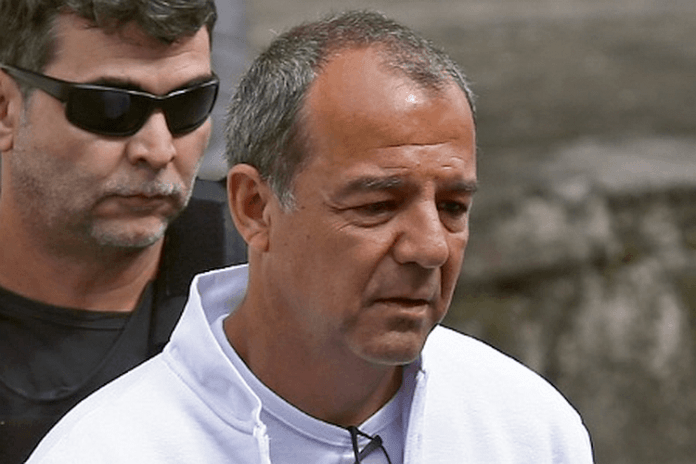Sergio Cabral, who served as the governor of the Brazilian state of Rio de Janeiro from 2007-14, told a Brazilian court on Thursday that he authorized the payment of $2 million in bribes to former International Olympic Committee member and International Association of Athletics Federations chief Lamine Diack (SEN) to buy votes of IOC members for Rio de Janeiro’s bid to host the 2016 Olympic Games.
The testimony was presented at a hearing that, according to Reuters, was requested by his defense team as part of an effort to reduce his prison time; he has been convicted in multiple corruption schemes and sentenced to nearly 200 years in prison.
Cabral’s testimony tied up multiple open questions surrounding Rio’s bid for the 2016 Games, which it won in 2009:
● Cabral said that Carlos Nuzman, then head of the Brazilian Olympic Committee and later head of the Rio 2016 organizing committee, approached him with the idea.
“Nuzman came to me and said, Sergio, I want tell you about the president of the International Athletics Federation, IAAF, Lamine Diack, he’s someone who is open to taking bribes.” Nuzman assured him that this was worth doing since Diack had arranged votes previously.
“I said, Nuzman, what are our guarantees here? And he said, ‘traditionally he sells 4, 5, 6 votes. There is a risk that we don’t get through to the second round (of voting).”
Cabral told Judge Marcelo Bretas that Diack “guaranteed” six votes for $1.5 million, but asked for an additional $500,000 to obtain three more votes. Cabral approved the payment, which was funded by American businessman Arthur Soares, who obtained contracts from Brazilian government offices worth about $960 million during Cabral’s tenure as governor, and was made through Nuzman.
● Cabral, now 56, said that neither former Brazilian President Luiz Inacio Lula da Silva (currently imprisoned) and former Rio Mayor Eduardo Paes did not know of the bribery plan, but were informed afterwards.
Cabral said he told Paes about the payoffs prior to the 2009 IAAF World Championships in Berlin (GER), held in August, prior to the IOC’s 2009 vote in Copenhagen (DEN). This is an edited online translation from the original Portuguese:
“I said, ‘We have to go to Berlin. And here I want to tell you something.’ I said, ‘Boy, Nuzman had it here … I got it right. Arthur Soares is going to give money so we can have a number of votes. You have to go there to see the head of the president of the Athletics Federation, greet him. Imagine if the host of the house will not? Is there anything more important to you, in the first year of your term, than the Olympics? We now have that guarantee. Are you afraid of being defeated? I was afraid too. But now that fear is far away.’”
Diack was President of the IAAF from 1999-2015 and is set to be tried for bribery, extortion and money-laundering in France later this year. He was elected to the IOC in 1999 and was suspended (later resigned) in 2015.
● Cabral named two then-IOC members who he says were bribed: Ukrainian Sergey Bubka, the 1988 Olympic champ and six-time World Champion in the pole vault, and Alexander Popov (RUS), the four-time Olympic gold medalist in the 50-100 m swimming freestyles in 1992 and 1996.
“They assured me that Sergey Bubka, a Ukrainian athlete, was given a tip. Another athlete who is not athletics, but, according to them, also received the Russian Alexander Popov, great world champion.”
Bubka is a current IOC member; Popov was a member from 2000-2016 and is currently an Honorary Member.
● Cabral noted that Rio’s worry was the first ballot, where the vote was expected to be close and the city with the lowest vote total would be dropped. He proved to be correct:
= Round 1: Madrid 28, Rio 26, Tokyo 22, Chicago 18 (Chicago eliminated)
= Round 2: Rio 46, Madrid 29, Tokyo 20 (Tokyo eliminated)
= Round 3: Rio 66, Madrid 32 (Rio selected)
Cabral’s testimony was challenged by former Rio 2016 Director General Leonardo Gryner, also implicated, as false and Soares “said he will provide clarification in a timely manner.”
This explosive testimony will have repercussions for Nuzman, still on trial for corruption in Brazil relating to the 2016 Games, and for Diack, who has been under house arrest in France since 2015. Now 86, could Diack now feel cornered and willing to confess to some of the details of his bribery schemes?
The bribery allegations concerning Rio surfaced two years ago, but similar questions have been raised about Tokyo’s victory for the 2020 Games at the 2013 IOC Session. And Nuzman’s comments about Diack to Cabral that he had been involved in note-buying previously may open the selections of prior Games – 2004 to Athens or 2008 to Beijing, perhaps? – to investigations. Nuzman, now 77, was a member of the IOC from 1995-2012.
Cabral’s revelations – if judged to be true – fill in the details of the Rio bribery story, of a bid city which was desperate to win, had correctly identified its weakness in the voting rounds, and willing to use illegal means to assure its position.
This creates new problems for the IOC and current President Thomas Bach (elected in 2013), further degrades the legacy of previous IOC President Jacques Rogge (BEL), brings into question who else was bribed – there are only two still-serving members from Africa who were on the IOC in 2009 – and impacts the ongoing trial of Nuzman and the forthcoming trial of Diack.
It also raises questions about the government of Senegal, which: (1) refused the extradition of Diack’s son, Papa Massata Diack, implicated in all of his father’s dealings and who has remained in his home country, and (2) is the host for the 2022 Youth Olympic Games in Dakar, the first-ever Olympic event to take place on the African continent.
The testimony also validates Bach’s efforts to essentially eliminate the IOC’s all-or-nothing bid process with the reforms passed last month at the IOC Session in Lausanne. While IOC members will still vote on the city/region/countries to host the Games, it’s likely that only one candidate will be put forward, following a “dialogue” process that will end up as a courtship.
Slowly, the truth about the Diacks and Rio 2016 appears to be coming out. But as Winston Churchill famously said in another context: “This is not the end. This is not the beginning of the end. But it is, perhaps, the end of the beginning.”
Rich Perelman
Editor


























